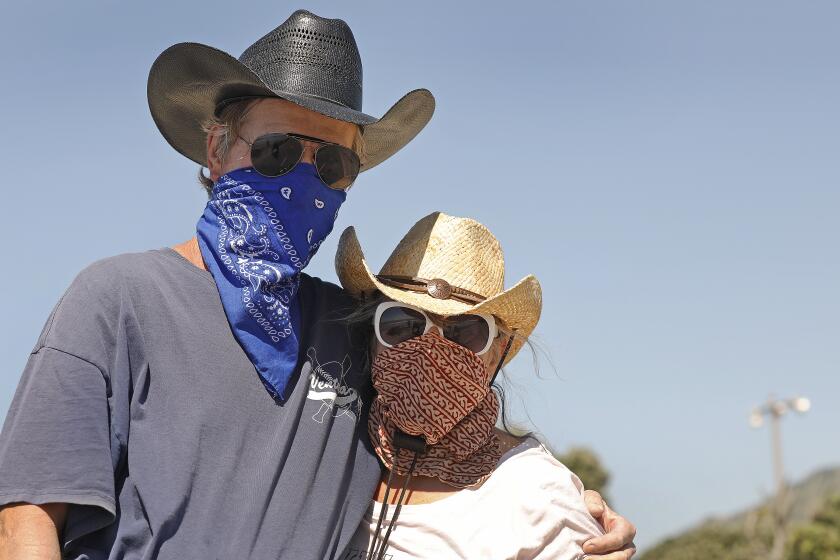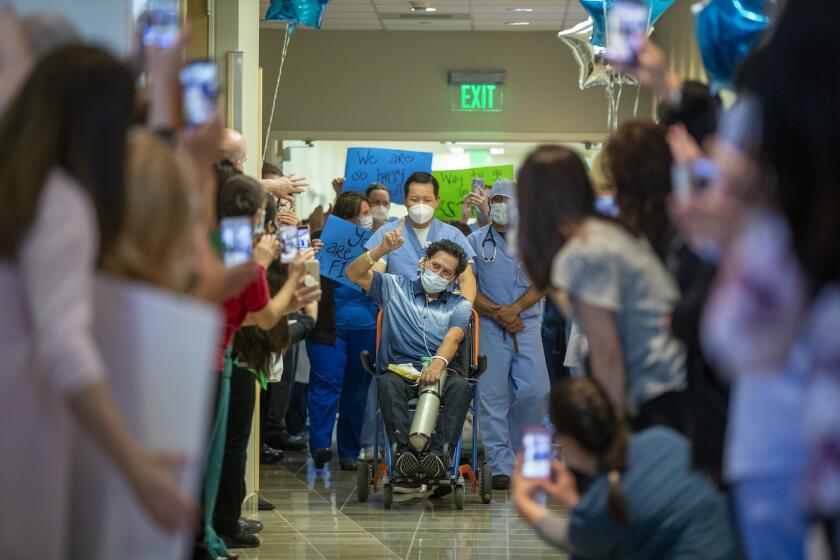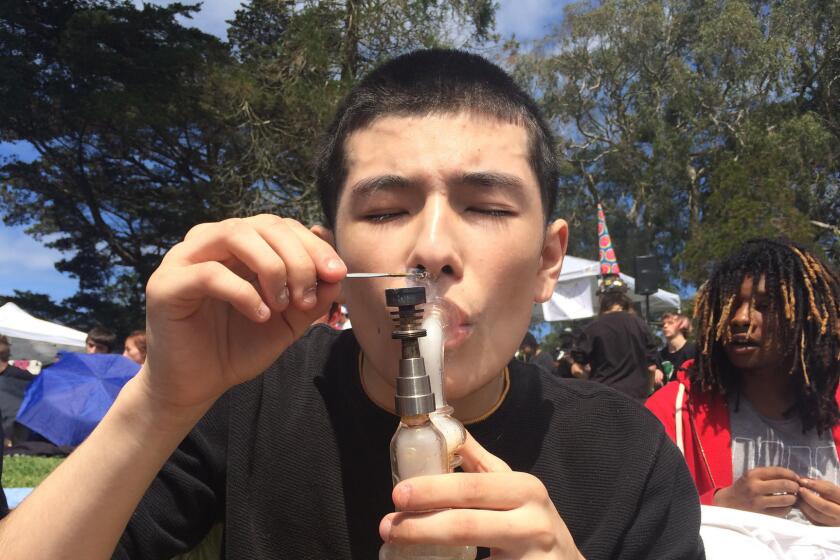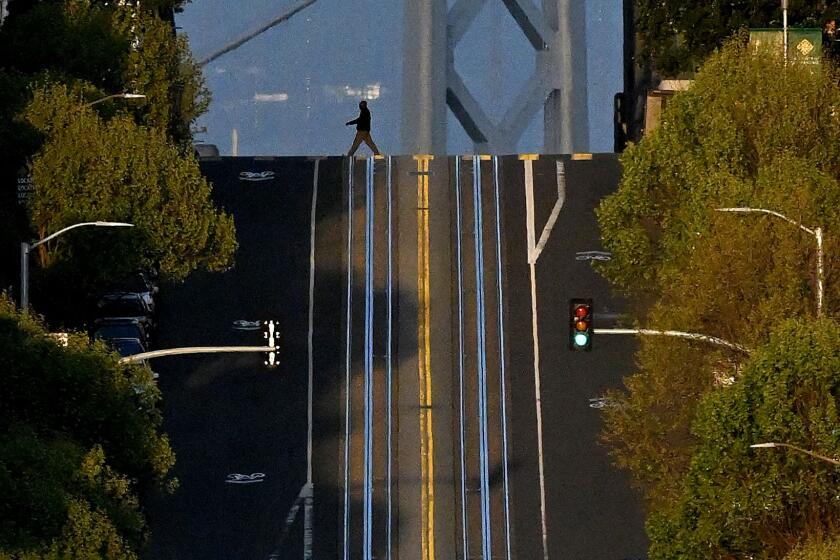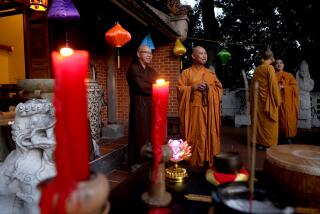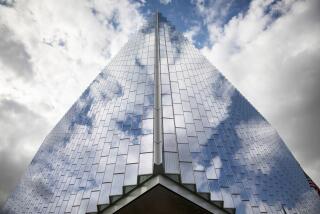Across California, festivals and fairs fall victim to the coronavirus
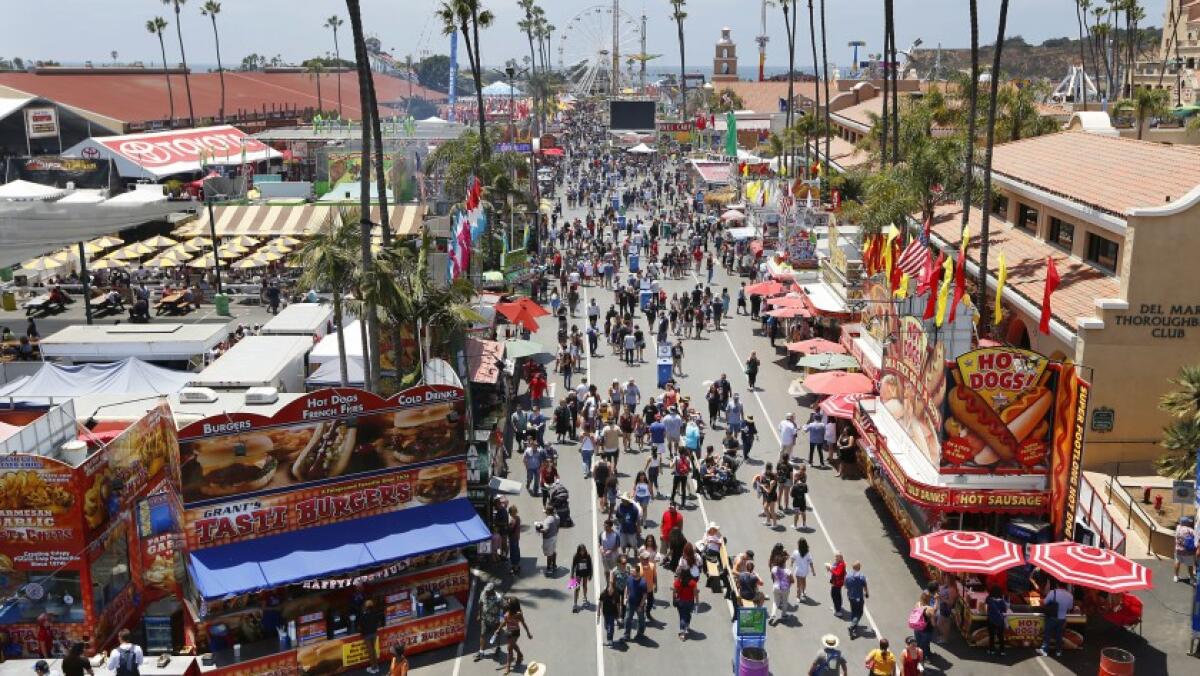
- Share via
The San Mateo County Fair has been closed to visitors only once in its 86-year history — and that was during World War II.
This year will be the second time, as the summertime staple has been scrapped amid the widening coronavirus pandemic.
“We will get through this and emerge stronger and better together,” fair Chief Executive Dana Stoehr said in a statement announcing the cancellation. “We look forward to welcoming you back as soon as the crisis is behind us.”
San Mateo isn’t alone. Across California, county fairs — equal parts carnivals, community celebrations and commemorations of a rich agricultural legacy — are being canceled, postponed or downsized amid the pandemic.
The latest updates from our reporters in California and around the world.
Events ranging from the San Bernardino County Fair to the Calaveras County Fair & Jumping Frog Jubilee have already been struck from the calendar, and state officials are warning not to expect large-scale to-dos to resume anytime soon.
“The prospect of mass gatherings is negligible at best until we get to herd immunity and we get to a vaccine,” Gov. Gavin Newsom said Tuesday.
The latest domino to fall was the San Diego County Fair, which was officially postponed Tuesday until next year. The event, originally scheduled for June 5 through July 5, has drawn upward of 1.5 million visitors annually in recent years.
“The health and safety of our community takes precedence during this unprecedented time of crisis,” Del Mar Fairgrounds Chief Executive and General Manager Tim Fennell said in a statement.
A similar fate could befall the Orange County Fair, which drew nearly 1.4 million attendees last year. Its board of directors will meet April 27 to discuss whether to cancel the event, which is scheduled to run July 17 through Aug. 16.
These are some of the unusual new scenes across the Southland during the coronavirus outbreak.
“When the time is right, we will be so happy to welcome our guests again,” said OC Fair & Event Center Chief Executive Michele Richards. “For now, please stay safe and healthy, and we will continue to work on future events and to follow official health directives to keep us all safe.”
Some summertime fests are hopeful they can avoid any interruptions.
In El Dorado County, it’s “full steam ahead with plans for this year’s fair,” which is scheduled June 18 to 21, according to a post on the event’s website.
“At this point, much of the data says the worst may pass by May, and that makes us optimistic. We feel it is premature to alter any details as it pertains to the fair other than to say we are concentrating on how to provide the safest possible environment for all concerned. Should anything change, we will let you know.”
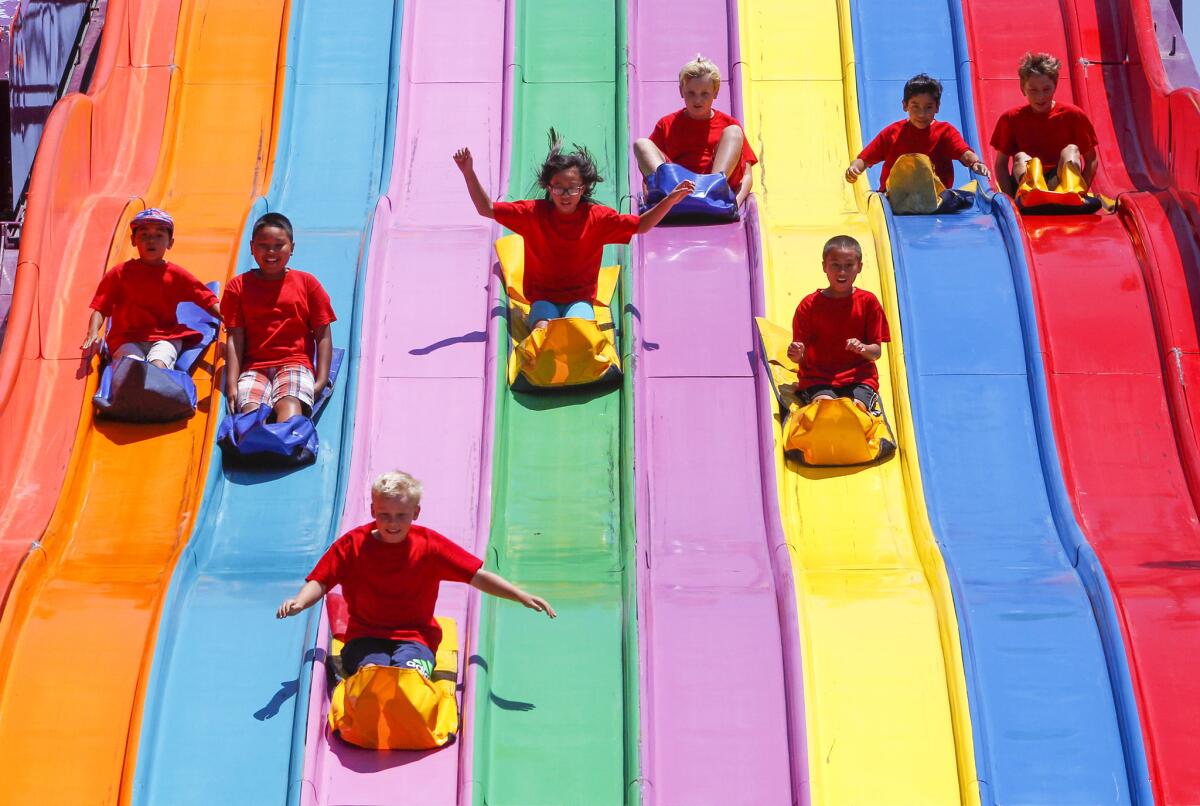
County fairs aren’t the only sizable events impacted by the pandemic. In San Francisco, the city’s Pride Parade — which was celebrating its 50th anniversary — was canceled Tuesday. The day before, San Francisco Mayor London Breed warned marijuana enthusiasts not to trek to Golden Gate Park on April 20, the cannabis holiday known as 4/20.
The Coachella Valley Music and Arts Festival was supposed to have begun its first weekend of multiple concerts last Friday. The mega-event was pushed to two weekends in October, along with the Stagecoach country music festival.
In Los Angeles, Mayor Eric Garcetti indicated that the city may hold off on allowing big gatherings until 2021 because of the coronavirus threat, according to an internal email reviewed by The Times.
During a staff conference call this week, Garcetti — who has repeatedly told Angelenos during his nightly press briefings that it would be a mistake to reopen businesses and stores before the pandemic can be controlled — said that “large gatherings such as concerts and sporting events may not be approved in the city for at least one year.”
Garcetti spokesman Alex Comisar confirmed the mayor’s comments at the meeting and said there is no timeline for Los Angeles to begin resuming large-scale events.
The coronavirus pandemic has upended the annual marijuana celebration that typically draws thousands of smoky revelers to San Francisco’s Golden Gate Park.
“The mayor was generally referencing studies of current and historical data and best practices for safely reopening our economy,” Comisar said.
While keeping their fingers crossed that some events will proceed as planned, organizers have seen day-to-day operations upended by the pandemic.
The Fairplex in Pomona — home of the Los Angeles County Fair — has had to postpone roughly 30 events from March, April and May and furlough about 80% of its workforce, according to President and Chief Executive Miguel Santana.
“We’re no different than anyone else or any other major venue,” he said Wednesday. “We’re taking it day by day, trying to adapt to the information that we receive and continuing to hope for the best.”
While the plan is for the L.A. County Fair to continue — it’s currently scheduled Sept. 4-27 — Santana said many logistical aspects still need to be ironed out.
Should guests be handed masks as they arrive? Does the Fairplex need to limit the number of people on the property at any one time? How do you manage lines so social distancing can be enforced?
“We’re in the business of keeping our community safe and responding to what’s happening locally and around the world, so we are prepared to do that again for the fair,” Santana said. “At the end of the day, we will get the directive from our county office of public health about how we do that, and we’re already trying to think ahead to what that could potentially look like.”
The public should realize that COVID-19 cases are likely to rise when stay-at-home orders are eased, officials said.
With more than 25,000 coronavirus infections and over 800 deaths across California, some fairground properties are becoming cogs in the statewide response.
The Contra Costa County fairgrounds in Antioch is among those that will be converted into a possible care site for COVID-19 patients, officials said. That county’s fair — previously scheduled May 14-17 — was canceled in mid-March.
Chief Executive Joe Brengle said in a statement that the facility “is here to help the community during this time of need, and happy to work with the county of Contra Costa as we all work together to end this pandemic.”
At the Orange County fairgrounds in Costa Mesa, “There are currently 10 temporary trailers on site that could potentially be used for emergency housing for unsheltered residents,” according to spokeswoman Terry Moore.
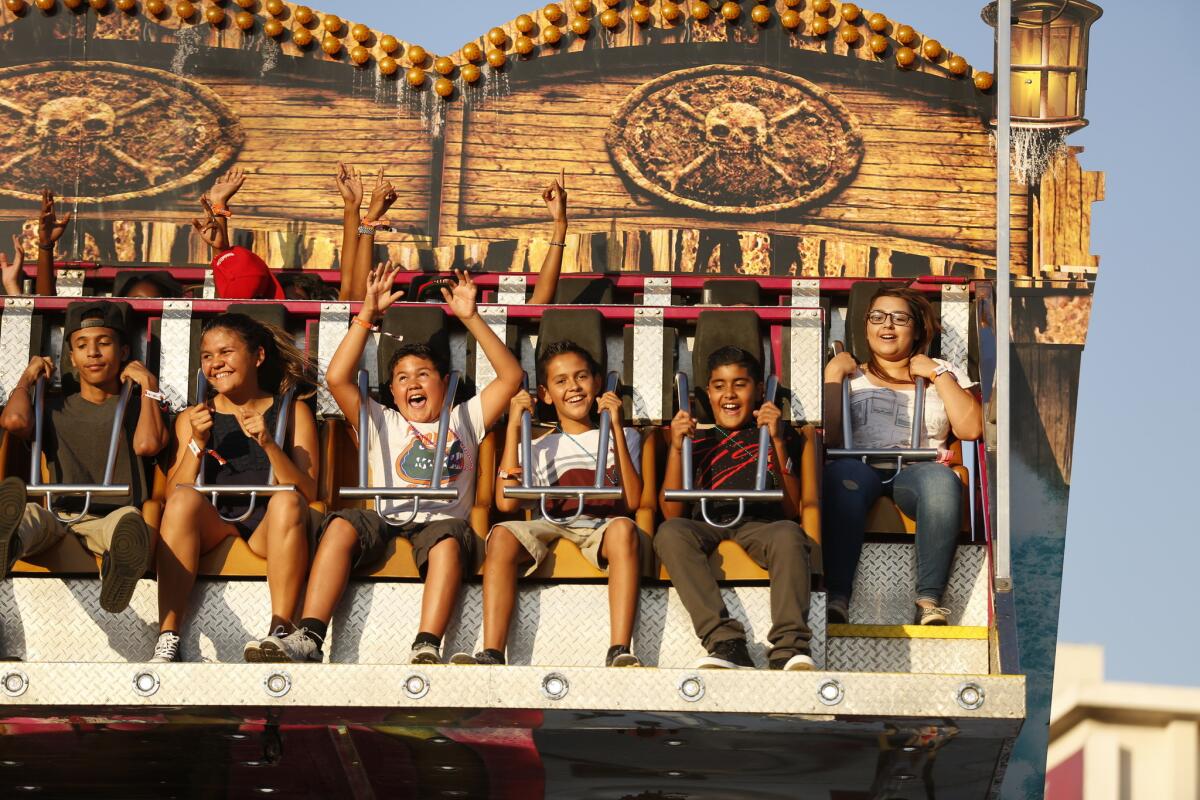
“Also, the Orange County Health Care Agency has assessed the property and is considering the use of buildings in the main mall area as a secondary plan for hospital overflow should the current positive trend in the number of hospitalizations change,” she added in an email Wednesday.
The Sheraton Fairplex Hotel is currently housing medical professionals and first responders who have been exposed to the virus or have tested positive and need to self-quarantine.
The Fairplex also is “providing free child care for families of first responders and other essential workers,” Santana said, and partnering with a local nonprofit to stage a drive-through food pantry on the property.
“This is a crisis that impacts everybody, you know?” he said. “The people who are exposed are our family members, our neighbors, our friends, and it doesn’t discriminate based on income or where you live or your race or ethnicity. This is a universal crisis that every person on the planet is experiencing, so we felt it was important that we do everything we can to be of service in the broadest way possible.”
Times staff writers Dakota Smith and Ben Welsh contributed to this report.
More to Read
Sign up for Essential California
The most important California stories and recommendations in your inbox every morning.
You may occasionally receive promotional content from the Los Angeles Times.
